In November, Kazimieras Simonavičius University (KSU agreed to collaborate with Skyllence – a company specialising in organising charter flights, offering flight planning and execution services.
This partnership will create valuable career and learning opportunities for students in KSU’s Aviation Management Bachelor’s and Master’s programmes.
It has been agreed that Skyllence will offer KSU students and participants of the Aviation & Space Academy lectures, internship opportunities, and other activities, where experienced experts from the company will share their industry knowledge.
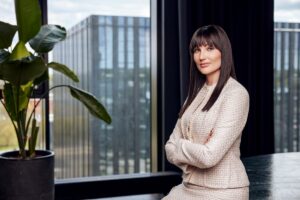 Vilma Vaitiekūnaitė, CEO of Skyllence, states that the company is ready to share its long-standing experience and expertise with KSU students, future aviation sector professionals. “As the aviation industry grows, we face a shortage of aviation administration specialists, and we see KSU, which trains the professionals needed in the aviation market, as our strategic partner in addressing this issue. We are therefore thrilled to offer students more opportunities to test themselves in different areas of aviation. We are ready to help deepen knowledge about charter flight organisation, which is our company’s area of expertise,” she says.
Vilma Vaitiekūnaitė, CEO of Skyllence, states that the company is ready to share its long-standing experience and expertise with KSU students, future aviation sector professionals. “As the aviation industry grows, we face a shortage of aviation administration specialists, and we see KSU, which trains the professionals needed in the aviation market, as our strategic partner in addressing this issue. We are therefore thrilled to offer students more opportunities to test themselves in different areas of aviation. We are ready to help deepen knowledge about charter flight organisation, which is our company’s area of expertise,” she says.
Deimantė Žilinskienė, Head of the School of Business Innovation and Communication at KSU, says that with this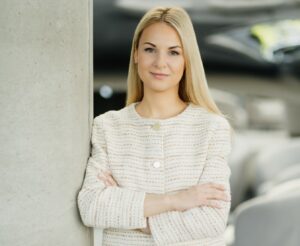 partnership, Skyllence demonstrates social responsibility by investing in the next generation of aviation professionals. “By offering invaluable insights from their field of activity, the company will contribute to the professional development of KSU students and others interested in the aviation industry,” she notes.
partnership, Skyllence demonstrates social responsibility by investing in the next generation of aviation professionals. “By offering invaluable insights from their field of activity, the company will contribute to the professional development of KSU students and others interested in the aviation industry,” she notes.
About Skyllence:
The charter flight company serves clients from the business, sports, music, entertainment, and cultural sectors, offering flexible and tailored flight solutions. With years of experience, the Skyllence team collaborates only with reliable partners who meet the strictest safety standards, selecting the most suitable aircraft and routes for each client, ensuring all flights are carried out to the highest service standards.
The company handles even the most complex private jet hire and logistics requirements, fulfilling the most demanding customer requests.
In October, Kira Skrypnyk joined the Science and Competence Center at Kazimieras Simonavičius University (KSU) as Senior Career and Integration Manager. Her role focuses on guiding students toward successful career and building their professional networks.

Joana Burn Photography
“We want our students to be fully prepared for their careers, and we’re thrilled to welcome Kira Skrypnyk to our team. Kira brings valuable experience in academic product development, marketing, and communication,” shares Rector Prof. Dr. Jolanta Bieliauskaitė. She emphasizes the importance of a smooth start to students’ professional journeys, helping them enter the job market with practical experience and established connections.
The Rector also notes that the Career and Integration Manager’s activities will go beyond traditional career support. “Our goal is to build strong partnerships with well-known companies and organizations in Lithuania and across Europe. These partnerships will provide students with internship and job opportunities, as well as exclusive access to industry expertise,” she adds.
In line with this goal, KSU, together with social partners, plans to organize training sessions, knowledge-sharing events, and seminars on career and integration topics such as business, human resources, and communication. These partnerships will allow KSU students to learn about current business practices and gain valuable insights into the evolving job market.
 “We understand that preparing students for the future means not only equipping them with academic knowledge but also helping them understand how the business and industry worlds operate. Many of us remember the challenges we faced after graduation, moving into the next stage of our careers. This experience underlines our commitment to providing students with both practical skills and professional networks. We deeply value the social responsibility shown by our partners. Their commitment to supporting our career counseling initiatives will have a significant impact, contributing to a stronger job market and creating growth opportunities for a new generation of professionals,” emphasizes Kira Skrypnyk, Senior Career and Integration Manager.
“We understand that preparing students for the future means not only equipping them with academic knowledge but also helping them understand how the business and industry worlds operate. Many of us remember the challenges we faced after graduation, moving into the next stage of our careers. This experience underlines our commitment to providing students with both practical skills and professional networks. We deeply value the social responsibility shown by our partners. Their commitment to supporting our career counseling initiatives will have a significant impact, contributing to a stronger job market and creating growth opportunities for a new generation of professionals,” emphasizes Kira Skrypnyk, Senior Career and Integration Manager.
Students can find more information about career and integration opportunities here.
SECUREU project partners are organizing the conference “SECURING TOMORROW: Preparing security specialists for future challenges” which will take place on November 7, 2024.
The conference will discuss the future challenges of the security field – how to conduct high-quality training of security specialists and how to prepare for security challenges in the future. Security professionals, lecturers and students are invited to participate in the conference.
The conference will feature a panel discussion titled “Does the security and defense industry have enough regeneration and how to promote it?” Experts will debate whether Latvia is successfully preparing enough new specialists in the field of security and defense and what needs to be done to attract young people to the sector. They will also discuss whether these new specialists have adequate skills and knowledge, as well as the future skills that security professionals will need.
Conference will take place in Riga, Turiba University, Latvia.
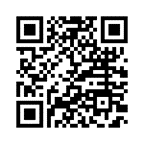
The conference will be livestreamed on Turiba’s Facebook page: https://www.facebook.com/Biznesa.au
Security professionals, lecturers, students, and anyone interested are invited to participate in the conference. Registration is open until November 1, 2024.
REGISTER HERE (only for on-site participation)
Participation is free of charge, and the working languages will be English and Latvian. Simultaneous translation will be provided.
The conference is organized as final dissemination event of ERASMUS+ SECUREU project. As part of this project, seven partners from Latvia, Lithuania, the Netherlands, Norway, Finland, and Spain have developed various educational materials in the field of security risk management.

Kazimieras Simonavicius University’s Rector, Prof. Dr. Jolanta Bieliauskaitė participated in the annual conference of the Central and Eastern European Network of Jurisprudence (CEENJ), held at the Faculty of Law, University of Belgrade, Serbia, on 11-12 October. She delivered a presentation titled “Jurisprudence and the Changing Landscape of Legal Professions,” exploring the evolving nature of legal careers in response to rapid technological and societal changes.
CEENJ is a collaborative network that brings together leading scholars from Central and Eastern Europe and beyond, fostering dialogue and research on key issues in jurisprudence. The network plays a crucial role in advancing legal thought, promoting regional cooperation, and enhancing the academic landscape in the field of law.
As a member of CEENJ’s International Advisory Board, Prof. Bieliauskaitė is actively involved in shaping the future direction of the network. She is also responsible for organizing the next CEENJ conference, which will be held in Vilnius, Lithuania, in 2025.
Alexander Tsigkas has been a visiting professor at Kazimieras Simonavicius University (KSU) for about four years, teaching in the Business Management and Organisational Innovation and Management programmes. He is also a postdoctoral researcher at the University of Ioannina in Greece, where his research focuses on the intersection of architecture, arts, and engineering from both theoretical and practical perspectives. Today, we asked Professor Tsigkas to share his experience of teaching at KSU.
What is your area of teaching?
My entire career has been connected to the manufacturing industry, and I have been teaching in this field for over 20 years. I start my courses with topics such as production management, supply chain management, and innovation management—quite broad areas.
We’re seeing a growing demand for skills that cross multiple disciplines. Specializing is great, but it’s equally important to think about how different fields can be synthesized. Years ago, I questioned how people could collaborate effectively without shared ground. While people excel in their specializations (vertical thinking), they often struggle with broader, interdisciplinary approaches (horizontal thinking). This is why broad knowledge and wide perspectives are so valuable today.
What motivates you to collaborate with KSU?
About ten years ago, I met a colleague at a conference in Switzerland, and we decided to keep in touch. Through her, I later connected with Deimantė Žilinskienė, the Head of Business Innovation & Communication School at KSU. I’m interested in long-term partnerships, not just one-off projects.
Why do you think KSU is a good place for students?
KSU has a strong international presence, which is very important to me. It’s essential for students to be exposed to diverse cultures and ways of thinking. Many students have told me that they chose Europe and KSU specifically because they wanted to experience different cultures. Lithuania is also an affordable destination for international students. While not all countries promote themselves as welcoming to international students, KSU does an excellent job attracting them. Europe, even without extensive advertising, remains a leader in many fields, and we still hold cultural and technological leadership, though I wonder how long that will last.
What are the main differences between the educational systems in Greece and Lithuania?
In Greece, private universities are not allowed by the Constitution. We do have private educational institutions like schools and high schools, but no private universities. The concern is that education might become commercialized, which could affect its quality. However, this issue can arise in public universities as well—not all are of high quality. Universities in Greece are free, except for some master’s programs, which are still quite affordable.
In which countries have you taught?
I’ve taught extensively in Germany for about 10 years and have teaching experience in Greece, the US, the UK, Italy, and other countries. I entered academia relatively late, at the age of 50, after a 25-year career in industry. I also studied architecture, though I didn’t work much as an architect in Greece. However, architecture is closely related to other fields, like engineering.
Do you have a memorable moment from your teaching experience at KSU?
I’ve worked in international environments throughout my career. In one of my classes at KSU, there were students from both India and Pakistan. We were discussing how to connect better with one another, and I asked them what the main issue was between their two countries. A student from Pakistan responded, “Maybe we shouldn’t talk about that. Let’s just leave it.” He likely felt that explaining the issue might lead to conflict, so he avoided it. Instead, he emphasized what unites both nations, noting that they share the same language. Despite the tensions between their countries, the students felt comfortable in the same classroom.
What advice would you give to students?
Stay hungry, stay foolish!
Three words about Lithuania?
Calmness, Architecture, Technology.
From September 29th to October 2nd, 2024, the ASPro – Aviation Safety Professional Diploma project partners gathered in Amman, Jordan, for insightful meetings and field visits to Amman Arab University (AAU), Mid-East Aviation Academy (MEAA), Balqa Applied University (BAU), and Jordan University of Science & Technology (JUST).
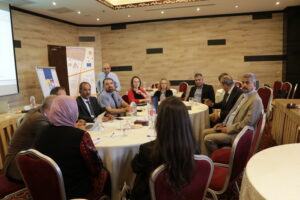 As the partner in this project, Kazimieras Simonavicius University (KSU) was represented by Rector Prof. Dr. Jolanta Bieliauskaitė and Erasmus Coordinator Kristina Šlekienė, who contributed to fostering collaboration with international institutions.
As the partner in this project, Kazimieras Simonavicius University (KSU) was represented by Rector Prof. Dr. Jolanta Bieliauskaitė and Erasmus Coordinator Kristina Šlekienė, who contributed to fostering collaboration with international institutions.
“Collaboration between institutions is crucial for fostering innovation in aviation education and training. Through shared expertise and resources, we can ensure a high level of safety and professional development in the industry,” said Prof. Dr. Jolanta Bieliauskaitė.
The ASPro project aims to develop an accredited Safety Management Systems (SMS) professional diploma, a comprehensive certification designed to streamline the training process for aviation safety experts. This diploma offers a cost-effective solution, helping aviation companies invest in the professional development of their teams, even in challenging economic times. 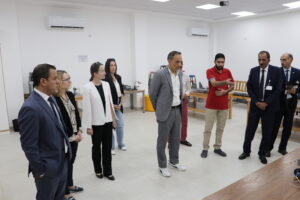
The project partners also include University of the Aegean (UAEGEA) (coordinator) and Creative Thinking Development (CRE.THI.DEV) from Greece, as well as Eskisehir Technical University (ESTU) from Turkey.
Stay tuned for more updates as we continue to elevate aviation safety education across the region!
Last week, Kazimieras Simonavicius University’s Head of the Business Innovation & Communication School, Deimantė Žilinskienė, attended the Riga Aviation Forum 2024.
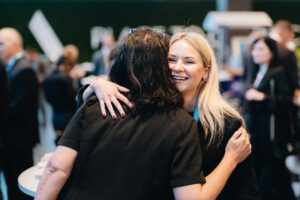 D. Žilinskienė shared her valuable insights during the panel discussion “Employment and Education” alongside renowned aviation and academic experts: Ivan Berazhny, Iluta Savicka, Ilmars Blumbergs, and Kristaps Lapsa.
D. Žilinskienė shared her valuable insights during the panel discussion “Employment and Education” alongside renowned aviation and academic experts: Ivan Berazhny, Iluta Savicka, Ilmars Blumbergs, and Kristaps Lapsa.
“There is a significant demand for aviation specialists across all areas of aviation, yet a considerable shortage. I believe we must promote this industry more, and that requires joint efforts from both academia and industry partners. I genuinely believe that aviation education should be focused and adaptable to different types of learners, as there are many opportunities to contribute and build careers in this field. In addition to excellence, innovation, I think that integrity, diversity, and inclusivity at their best should become core values in our teaching and learning” said D. Žilinskienė.
The Riga Aviation Forum brings together European and Baltic aviation stakeholders, leaders, and experts to discuss the future of aviation. The forum highlights strategic developments and innovations aimed at creating a more sustainable and climate-neutral aviation industry.
More information about the Riga Aviation Forum read here: Home – Riga Aviation Forum (raf.aero)
From 25-27 September, Kazimieras Simonavicius University (KSU) Vice-Rector, Dr. Loreta Tauginienė, took part in the 32nd International Conference “Entrepreneurship in the Digital Age,” organised by the International Association for Management Development in Dynamic Societies (CEEMAN) in Innsbruck.
During the conference, Vice-Rector Dr. Tauginienė highlighted the threats posed by companies offering contract cheating services, describing them as predatory digital entrepreneurs. She emphasised that only a few countries worldwide, including Lithuania, the UK, and Australia, consider the activities of these companies to be not only unethical but also illegal.
Additionally, she pointed out that the rapid advancement of generative AI technologies has not slowed the growth of these companies.
Founded in 1993, CEEMAN aims to accelerate management quality development in Central and Eastern Europe and now functions as a global network promoting management excellence and educational development. With over 200 members from 50 countries across Europe, North America, Latin America, Africa, and Asia, CEEMAN is an influential platform for advancing management education worldwide.
Vice-Rector Dr. Loreta Tauginienė joined the CEEMAN network in 2024.
Kazimieras Simonavicius University (KSU) was represented at the 2024 EAIE (European Association for International Education) Exhibition in Toulouse from September 17-20 by Ingrida Kutkienė, Head of International Relations. Kutkienė participated in the workshop titled “Future-proofing Your Funnel: Unlocking Gen Alpha Insights for Student Recruitment Excellence,” led by Alejandra Otero (getNEOus, USA) and Menno Kramer (Utrecht University).
The workshop focused on equipping educational institutions to engage Generation Alpha, the cohort expected to start their educational journeys in the coming two years. Alejandra and Menno guided participants through the latest recruitment strategies tailored for Gen Alpha, offering an immersive experience filled with practical activities and case studies. These tools aim to help institutions future-proof their recruitment efforts and meet the expectations of this new generation.
Ingrida Kutkienė shared, “This workshop provided me with valuable insights into adapting our recruitment strategies for the next generation. The emphasis on innovation and engaging prospective students as co-creators aligns perfectly with KSU’s forward-thinking approach.” Kutkienė further noted that EAIE serves as an exceptional platform for networking, fostering inspiring projects, and strengthening connections with both new partners and long-standing colleagues.
More about the event: EAIE Toulouse 2024 | International Education conference
From September 9-13, 2024, representatives from Kazimieras Simonavicius University (KSU) participated in the Luhmann Conference held in Dubrovnik. This year’s conference, themed “Guiding Distinctions – Observed with Social Systems Theory,” brought together leading sociologists and researchers from around the world, spanning countries such as Argentina, Canada, South Africa, and Japan.
The conference featured diverse discussions ranging from leadership and management to art and literature, providing an enriching platform for scholarly exchange. A notable highlight of this year’s event was the presentation of the Best Paper Award to Prof. Diane Laflamme of Université du Québec à Montréal for her innovative research, “Is Ethics a Utopia? Yes, when Moral Distinctions Impair the Ethical Aim.” Prof. Laflamme’s paper offers a unique analysis of the convergence between Luhmann’s digital theorizing and Ricœur’s analogue philosophy, shedding new light on ethical reasoning in a digital age.
Organized annually by the Next Society Institute (NSI), founded in 2020 as part of KSU, the Luhmann Conference continues to foster global collaboration and exploration of social systems theory.
For more information, visit the official conference website: Luhmann Conference
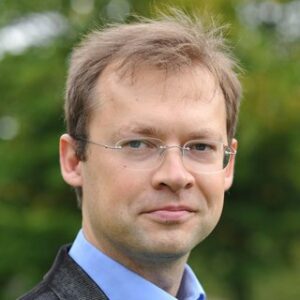 We are proud to announce that Prof. Dr. Vladislav Valentinov, a distinguished researcher affiliated with Kazimieras Simonavicius University‘s Next Society Institute, has been honored with the Outstanding Paper Award in the 2024 Emerald Literati Awards. This prestigious recognition was awarded for his article “Sustainability and Stakeholder Theory: A Processual Perspective” published in the journal Kybernetes.
We are proud to announce that Prof. Dr. Vladislav Valentinov, a distinguished researcher affiliated with Kazimieras Simonavicius University‘s Next Society Institute, has been honored with the Outstanding Paper Award in the 2024 Emerald Literati Awards. This prestigious recognition was awarded for his article “Sustainability and Stakeholder Theory: A Processual Perspective” published in the journal Kybernetes.
The article addresses a critical issue in the realm of corporate sustainability—the epistemic challenge of sustainability within corporate settings. Prof. Dr. Valentinov emphasizes the complexities managers face in both identifying and addressing sustainability problems. He suggests that effective corporate stakeholder management policies could provide a viable solution to these challenges.
The publication contributes significantly to the advancement of stakeholder theory in two key ways:
New Justification for Stakeholder Theory: It underscores the growing importance of cooperative adaptation, providing a fresh perspective on the value of stakeholder theory.
Dual Benefit in Corporate Settings: The paper demonstrates that effective stakeholder management is crucial for maximizing both economic and sustainability performance, thus offering a dual advantage for corporations.
These insights highlight the vital role of cooperative stakeholder management in overcoming corporate sustainability challenges.
Prof. Dr. Vladislav Valentinov‘s recognition in the 2024 Emerald Literati Awards is a testimony to the university‘s commitment to high-impact research. According to Clarivate Analytics (Web of Science) indicators-based evaluation by the Research Council of Lithuania, KSU’s research publications are consistently ranked within the top 10 percent of the world’s most highly cited scientific articles.